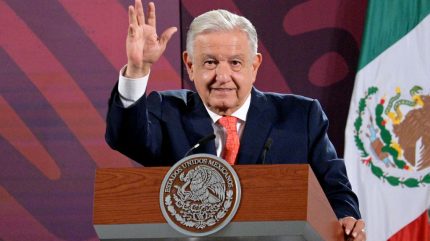
Mexican President Andres Manuel Lopez Obrador, commonly known as AMLO, is one step closer to passing his highly criticised judicial reform. Last week, the bill was approved by the lower house after almost 18 hours of debate.
The reform has sparked criticism from opposition parties but also legal scholars, foreign governments and workers in Mexico’s judicial system.
A group of international companies in Mexico, including Nestle SA, AT&T Inc. and others, has urged AMLO to amend the reform so it safeguards judicial independence and commits to international trade regulations. They warn that, otherwise, the reform could spook investors.
What’s in the reform?
The most contentious part of the bill would change how judges are appointed. Rather than the current model of working their way up to higher positions through periodic reviews and evaluation committees, judges would be elected by popular vote. The current system has not been successful at punishing corrupt judges.
Other changes include reducing judges’ terms, capping their salaries and creating a judiciary disciplinary body that would also be elected by popular vote. The requirements to become a judge would also be lower. Anyone with a law degree could run for the position, as long as they have a few years of experience “in judicial areas.”
AMLO and his recently elected successor, Claudia Sheinbaum who is set to become Mexico’s first female president, have emphasised that the reform will address the corruption which plagues the country’s judicial system. However, critics say that given the ruling party’s widespread support, the reform would eliminate an important check on their power.
It has also been criticised as a misguided approach to a real and persistent problem. While Morena, the ruling party, argues that letting voters decide would make it easier to punish bad judges, many say that the problem is that police and prosecutors are ill-trained, overwhelmed and corrupt. 90% of crimes in Mexico don’t get reported.
Tensions rise
US Ambassador to Mexico Ken Salazar warned that the changes “could damage relations a lot, and it’s not just me saying that.” He warned that if the reforms passed, it would negatively affect investment and the economy. He added that the “popular direct election of judges is a major risk to the functioning of Mexico’s democracy.” The Canadian Ambassador Graeme Clark echoed Salazar’s preoccupations.
AMLO has paused diplomatic relations with the US and Canadian embassies following these comments.
The current president has said that the reforms are directly aimed at foreign companies.
“The corrupt judges, ministers, justices, are they going to continue defending this? Are they going to continue defending foreign companies that come to loot, rob and affect the economy of the Mexican people? […] Are they going to continue representing these companies?”
Sheinbaum, AMLO’s less incendiary protégé, has been trying to placate worries with a more diplomatic approach. She has met with foreign investors, international organizations and business leaders to reassure them of Mexico’s political stability.
She assured that “the reforms to the judicial system will not affect our commercial relations, nor private Mexican investments, nor foreign ones. Rather the opposite, there will be a greater and better rule of law and democracy for everyone.”
If investors pull away, it would be bad news not only for Mexico but for the region. The country was the second-largest recipient of FDI in the region in 2023, accounting for 16.4% of total inflows. It also saw a rise in manufacturing FDI which, according to the UN Economic Commission for Latin America and the Caribbean, could be evidence that multinational firms are interested in investing in countries with manufacturing capacity but lower labour costs closer to US shores.
Sheinbaum will have to strike a balance between addressing corruption, safeguarding democracy and keeping the door open to foreign investments that make Mexico one of the most important economies in the region.



